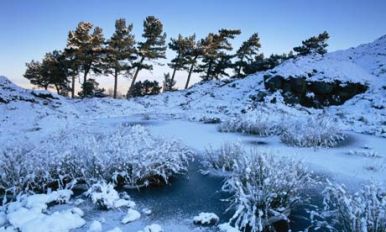
In my more than 16 years working for this newspaper, not one has gone by when I haven’t been sent out into the elements during a nasty bout of winter weather, even when it requires standing knee-deep in a snowdrift during a blizzard.
Still, in all those years, I don’t recall ever hearing the above three terms to describe the various indignities Canadians endure this time of year. Yet, these days, it seems you need a weather Thesaurus to keep up to date on the explosion of Armageddon-like descriptions for when the thermometer plunges.
In his more than 40 years on the front lines of weather watching, Dave Phillips also can’t remember hearing so many catchy names. “I called my hairdresser this morning to make an appointment,” says the senior climatologist with Environment Canada. “The first thing he said to me was, ‘Hey, what about those Frost Quakes?’ We usually chat about last night’s hockey game, but now everyone wants to ask me about things like Frost Quakes.”
You can hardly blame us denizens of the Great White North for being overly preoccupied with the weather as of late. Between the ice storms of Ontario, the coldest December on record in our city and this week’s wildly mixed bag of balmy weather and instant snow storms, it’s been hard to think of much else. Oh, and let’s not forget the fact that on New Year’s Eve, Winnipeg was colder than Mars — the planet, not the small community near Pittsburgh, Penn.
According to Phillips, the combination of wild weather and the rise of social media have created a perfect storm, pardon the pun, of weather obsession. “A lot of these have been around forever,” Phillips says of terms like Polar Vortex, which in North America’s case refers to a cyclonic mass of cold air coming from the North Pole. “What’s different is that now, the general public knows them.”
When he started out in the business four decades ago, Phillips would never have considered using terms like Pineapple Express (a flow of atmospheric moisture from the Hawaiian Islands) with anyone outside of his field. “We were supposed to just present the facts, not editorialize or comment on them.”
Then came the world of social media. “You get a term like Polar Vortex out there and it spreads like wildfire,” he says. “People want us to explain it to them.”
While the Internet has always been a breeding ground for misinformation, Tom Keenan thinks the rise of weather topics has been a good thing. “Weather is fundamentally boring,” says Keenan, a professor in the faculty of environmental design at the University of Calgary and author of the forthcoming book TechnoCreep (orbooks.com). “We’ve been using all these names to make it more interesting, but it’s also sparked in people a desire to know more.”
Click here to read the full article by Valerie Fortney in the Calgary Herald.

